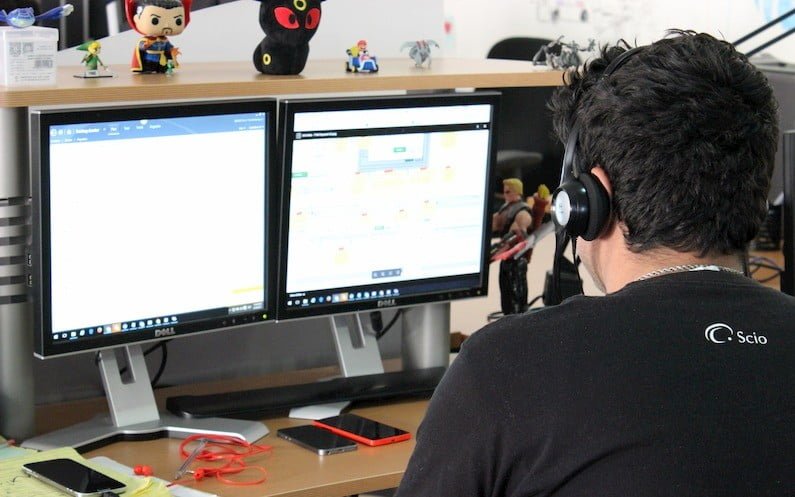By Rod Aburto
These last few months, I’ve been thinking a lot about something happening in the car industry of the United States. Many of the bigger automotive companies are considering a reimagining, becoming more of a service industry than a manufacturing one.
Following similar models like Uber, these companies want to go from selling cars to offering an urban transportation model where you can use an app to request a, let’s say Ford, and a few minutes later a car will appear to take you to wherever you need to be.
This is a really interesting change of paradigms, where the new goal is to offer a service that solves the traffic issues in cities like Los Angeles, where you have a 6 or 7-lane superhighway that at certain hours is completely overrun, because you have one person per car and everyone wants to go to the same place.
This resonated with me, and I think it’s some sort of inertia that’s catching up to us, and we are rethinking a lot of systems we took for granted. For example, our jobs. We first had a factory floor with a production line, then an office full of cubicles, and now we question if the concept of someone checking we clocked in at 8:00 am is obsolete.
Now, maybe my opinion is very particular and it doesn’t necessarily reflect the rest of my team, but I think that, for the software industry, the pandemic didn’t mean some radical change in the way we produce things; after all, we didn’t have to close the curtains and turn off the machines like in the manufacturing industry.
We had cloud systems that didn’t depend on a physical server in an office, which was already becoming an industry standard by the time the pandemic hit. What did bring us was uncertainty about what it really meant for us, and how long it would last.

There’s opportunity in every crisis, I think; the chance to reinvent yourself and try new stuff you never considered before. Lots of collaboration apps and software, for example, started growing and adding features and tools that they didn’t have before.
This crushed a lot of restrictions that we used to have, where we looked strictly to our local surroundings in search of talent, and everything outside of it was uncertain or needed some precaution to approach.
However, since the pandemic started, I consider that both for past clients and new ones we had since the lockdowns began, doubts about working with remote teams are fewer and fewer.
And on top of all that, the so-called “Great Resignation”, in which a huge swath of the workforce started leaving their jobs, trying to find better opportunities, a total career change, or just to question the current status quo that picked up speed in 2021, ushered the need to look for solutions elsewhere.
Now, many cities in the United States are living through a mass exodus because today we don’t need to be concentrated on expensive places, where few transport options and high living costs were the prices to be part of the software industry.
In fact, some of our clients are located in such places, and they realized that their workers not only can be in Wisconsin, Wyoming or Missouri; they are finding out the enormous amount of talent available in Mexico and other Latin American countries, who have no problem at all connecting remotely to collaborate together.
We can see that in our more recent applicants, who value these opportunities and are more than ready to join from anywhere in the world. Our focus in certain time zones that are not too far apart from our clients, but Latin America as a whole has opened as a software development possibility like never before.
So, what Nearshore comes to offer us is some transparency, in which a Development Lead can chat in real-time with a collaborator in Mexico, Chile, Argentina, Honduras, or some other countries, as a full member of their team.

This wasn’t strictly something the pandemic changed, but it did broaden the horizons of many of our North American clients, and this new way to look at collaboration will not stop at this point.
Of course, this wasn’t the only reinvention born out of this crisis; we can see it in industries like Hospitality or Show Business. Things like offering concerts online, or trying to bring the full restaurant dining experience to home are part of the efforts to survive and move forward during the pandemic.
I think this is the new way to do things; many entrepreneurs are normalizing the notion that, if a solution doesn’t exist already, they can create it, automatizing and digitalizing many processes and interactions that weren’t like that before.
Solutions as simple as WhatsApp came to be adopted more widely and consistently, in which a person has to take advantage of what already exists, and possibly help to develop what it doesn’t.
Having all this in mind, what Scio offers to clients in the United States is the opportunity to release some of the pressure of finding good software developers, whose costs and demand have skyrocketed in the last few years, and we want to be an ally that brings the level of talent they want.
Because, before the pandemic, the big question about working with remote teams for many American entrepreneurs used to be “is it possible to find a reliable level of technical skill outside the United States?”
And the answer is yes, of course. A big part of the promise of Scio is doing our part and preparing the people getting into the industry so they are ready to work on real projects with real clients, in an amount of time we have been able to reduce more and more. In the beginning, it took us six months of training, and now in just three, our new developers are ready to enter projects in full and be as productive as possible.

This situation will undoubtedly continue and now, with remote work and home office being a normal part of life, we can do so with talent coming not only from our city, but from all of Mexico and Latin America by leaving old concerns about working remotely behind, which can only change our industry for the better.
Of course, this doesn’t mean we, as a company, weren’t concerned with this shift in perspective; we invested a lot of effort into promoting interactions that would let our developers feel part of a group, where not a single member of Scio is isolated, and everyone is working towards a shared goal, from wherever they might be.
So yes, I think the biggest change the pandemic brought to us was the ability to say, “let’s work with a team in Latin America” with total confidence that every person at home is a complete professional able to give his 100% without the need of somebody managing his tasks or schedules.
